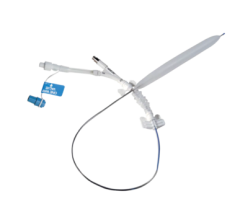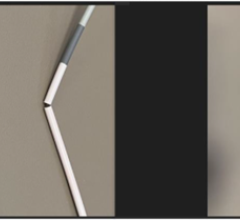
September 18, 2017 — Philips announced the two-year results from the ILLUMENATE European randomized clinical trial (EU RCT) demonstrating the efficacy of Philips Spectranetics' Stellarex .035-inch drug-coated balloon (DCB) for peripheral arterial disease (PAD) in comparison to uncoated balloon angioplasty. Marianne Brodmann, M.D., of the Medical University of Graz in Austria, presented the data as a late-breaking trial at the Vascular Interventional Advances (VIVA 17) Annual Conference, Sept. 11-14 in Las Vegas.
The ILLUMENATE EU RCT, which is part of a series of five clinical trials evaluating the safety and efficacy of Stellarex for superficial femoral artery and popliteal disease, includes 328 PAD patients from 18 centers across Germany and Austria and compares the Stellarex DCB to an uncoated angioplasty balloon. The results show that at 24 months, 75.9 percent of patients treated with Stellarex maintained blood flow through the treated segment of the diseased artery, assessed through blinded core-lab adjudicated patency. Only 61 percent of patients treated with an uncoated balloon still maintained blood flow at 24 months. The data shows that Stellarex demonstrates higher efficacy and patency results, and longer treatment durability compared to an uncoated balloon, which is the current standard of care in the United States.
"The Stellarex DCB produced durable results in this rigorous trial, validating earlier findings among the ILLUMENATE trial series," stated Brodmann. "These consistent, top-tier outcomes are achieved with a low-dose balloon. Stellarex is the first low-dose DCB to demonstrate a significant treatment effect at two years." Low-dose DCBs are those that deliver a dose of only 2 micrograms of the drug paclitaxel per square millimeter, which is lower than some other DCBs on the market, according to Philips.
The ILLUMENATE EU RCT has independent evaluation including supervision by a clinical events committee, a data safety and monitoring board, and assessment by angiographic and duplex ultrasound core laboratories. Philips Spectranetics fully funded the ILLUMENATE EU RCT as part of the ILLUMENATE series of five trials to evaluate the benefits of Stellarex .035-inch for various patient groups in comparison to an uncoated percutaneous transluminal angioplasty (PTA) balloon, which is the current endovascular standard of care.
The Stellarex drug-coated balloon is designed to restore and maintain blood flow to arteries in patients with peripheral arterial disease. Spectranetics launched the device in Europe in January 2015 and received U.S. Food and Drug Administration (FDA) approval in the U.S. in July 2017. Philips acquired Spectranetics in August 2017.
For more information: www.usa.philips.com/healthcare
Read about other Late-breaking Trial Presentations at ESC 2017.


 June 13, 2024
June 13, 2024 









